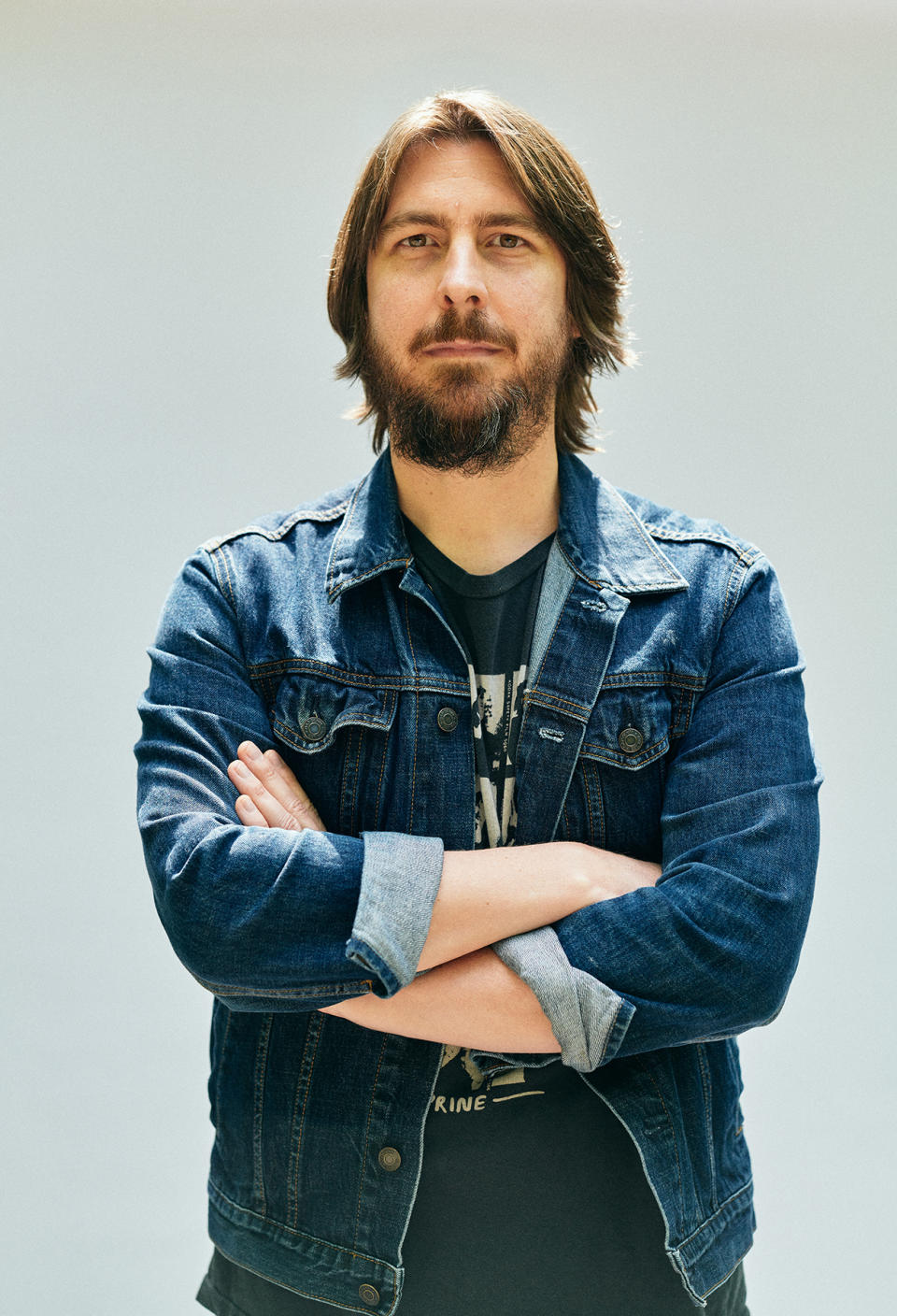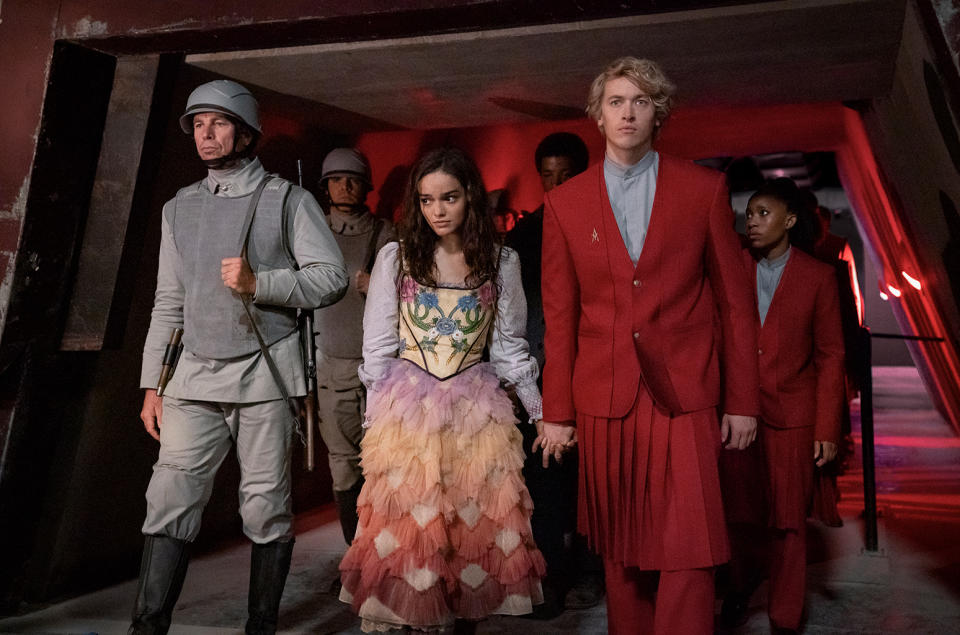Inside the Gritty, ‘Dangerous’ Music of ‘Hunger Games: The Ballad of Songbirds & Snakes’
- Oops!Something went wrong.Please try again later.
- Oops!Something went wrong.Please try again later.
- Oops!Something went wrong.Please try again later.
- Oops!Something went wrong.Please try again later.
- Oops!Something went wrong.Please try again later.

Four years after he finished work on the final big-screen adaptation of the zeitgeist-y Hunger Games book trilogy, director Francis Lawrence got a phone call from producer Nina Jacobson, another veteran of the series. And she wasn’t looking to reminisce.
Suzanne Collins – the mind and pen behind the dystopian sci-fi series – had just rung up Jacobson with some news: “Hey, surprise! I’m almost finished with a new book.” Lawrence sums up their reaction: “Wow…. Okay!”
More from Billboard
Dave Cobb Talks Working With ‘Genius’ Suzanne Collins on ‘Hunger Games’ Prequel Songs
Miranda Lambert's 'It Takes Balls' MuttNation Campaign Awards More Than $175,000 in Grants
Garth Brooks Announces 14th Studio Album 'Time Traveler': Here's When It Arrives
The Hunger Games scribe didn’t offer much information about her forthcoming novel, The Ballad of Songbirds & Snakes, other than that it was a prequel — and it incorporated “a big musical element,” Lawrence recalls.
After reading the book in early 2020, not long before it arrived on shelves, Lawrence was officially in. “I love a villain origin story,” he says of Songbirds, which tracks the rise of trilogy antagonist Coriolanus Snow. The same went for Jacobson. “Suzanne trusting me with this series, we’ve had an incredible rapport and bond,” she says. “I was all in.”
Returning to the director’s chair for The Hunger Games: The Ballad of Songbirds & Snakes – which hits theaters Nov. 17 – served as a dual homecoming for Lawrence. Not only was he returning to the Hunger Games arena, but to the task of pairing songs with distinctive visuals. After all, he first cut his chops as a music video director, helming clips for Destiny’s Child (“Independent Women Part I”), Shakira (“Whenever, Wherever/Suerta”), Justin Timberlake (“Cry Me a River”), Britney Spears (“I’m a Slave 4 U”) and Beyoncé (“Run the World (Girls)”), even winning the best music video Grammy for directing Lady Gaga’s “Bad Romance.” An impressive resume to be sure, but not an exact match for the musical milieu Collins imagined for this story.
Songbirds introduces us to Lucy Gray Baird (Rachel Zegler), an itinerant folk singer thrown into the titular kill-or-be-killed battle – as well as an unlikely romance with Snow (Tom Blyth). “[Collins] told me about the history of Appalachian music of the ‘20s and ‘30s and how often they were based on songs or ballads or poems that had been passed down for generations and collected over time,” Lawrence says of the music that inspired the character of Baird. Collins advised the director to check out Ken Burns’ 16-hour documentary Country Music (“this was during the pandemic, so I had time,” he adds) for context, but both of them realized that finding the right musical collaborator for the film – someone who lived and breathed this music — would be essential to making sure Baird felt like a dusty, jagged diamond in the rough.
Enter Dave Cobb. A Nashville mainstay who’s produced albums for Chris Stapleton, Brandi Carlile, Jason Isbell and Sturgill Simpson (i.e., country singers who value grit over studio polish), Cobb’s contributions for 2018’s A Star Is Born and 2022’s Elvis proved he could work within the Hollywood system without sacrificing his musical ethos.
When his name came up during pre-production, the team got on the phone to feel out his interest level. The connection was immediate.
“Talking to him, he’s an incredible historian of music and has such a passion that rivals Suzanne’s for the origins of what we think of as American music,” Jacobson recalls of their initial conversation. Lawrence agrees: “It was his resume but also just the chat. He’s such a great, smart guy and has such knowledge of the country music genre; he fit the family and is supremely talented.”

As for the nine-time Grammy winner, Cobb tells Billboard that Collins’ vast knowledge of history – music, political and otherwise – made him excited to hop on board and write songs to accompany her lyrics from the book.
“One of the things that was so attractive about working on this film [is that] I don’t think I’ve ever talked to a more intelligent person in my life than Suzanne Collins. She’s an absolute genius, by any measure,” Cobb says. “Suzanne telling me the impetus of the story had me captivated. I’m a history buff, and everything in this film — everything she’s written for Hunger Games — is derived from real history.”
That, however, presented an additional challenge: “I had to make [the songs] feel like turn-of-the-century, timeless classics. That’s a very hard thing to do,” Cobb admits with a laugh. But it wasn’t entirely outside his sphere of experience, either. “My grandmother was a Pentecostal minister, so I grew up with hymnals my whole life,” he says. “I’m very familiar with this sound growing up in the South and it was really fun to exercise that muscle of things I’d heard growing up, and put it into melodies.”
Collins’ musical acumen was an asset, too. “Dave had long conversations with Suzanne, and she’d give him the history of where the song came from,” Lawrence says, adding that Collins even “had some time signatures in mind” for certain songs before Cobb began writing.
“They have a shared love of the same music and the history of music,” Jacobson says. “She was present virtually for a lot of the recordings and had a lot of conversations with Dave, but gave him latitude, too. She always gives artists an enormous amount of freedom to interpret her work.” Lawrence seconds that: “He wrote the full songs, and we barely did changes.”
When it came time to hash out those songs with a band, Cobb intuitively knew a recording studio wouldn’t cut it.
“The big thing for me was to get the ability to be completely unorthodox,” he says. “We had this crazy idea to come down to my hometown of Savannah, Georgia, and rent an old mansion and record in that.” Using the seminal recordings of 20th century folk archivist Alan Lomax as a guiding light, Cobb found a “200-plus-year-old house” and brought along a few ringers — including bluegrass wonder Molly Tuttle — to record the guide tracks.
“With all the creaks in the walls, you can hear the history in the recording — it wasn’t like a clinical studio,” Cobb says. “The old microphones we used looked like they’d been under a bed for 75 years. Molly Tuttle played a big part – she played the guitar of Lucy Gray, and I found this old ’30s Gibson that she played on. It wasn’t just a regular acoustic guitar – it has character.
“That was a big part of making this come to life. There’s bleed between the bass going into the fiddle going into the banjo — it’s just absolute chaos in a way that makes things dangerous.”
Making it sound dangerous was only half of the equation, however. Ironically, to find a real-life location that looked Appalachian, the film crew decamped to Duisburg, Germany, filming a pivotal scene at an abandoned factory to evoke District 12’s black market district. “It’s something they would never do in the States – they turned [the factory] into a publicly accessible park and let nature take over,” Jacobson says. “There’s all these places where you can go into gritty, grubby basements with the equipment still there.”
With that as the backdrop, Zegler delivers one of the film’s finest musical moments, forcing our emotional investment in her romantic relationship with a character we know grows up to be a monster – all while singing the hell out of a breathtaking song that could pass for a long-lost Carter Family classic.
“Rachel is such an incredible talent that she ended up singing everything live [on set],” Cobb says of Zegler. “She’s so naturally gifted – it was effortless for her.”

Despite being one of the first people in talks for the role (and a fan of the franchise), Zegler initially wasn’t able to do the film because of hectic scheduling issues. As the search for Lucy Gray Baird dragged on, Jacobson grew concerned. “We auditioned a zillion people and there are a lot of wildly talented people out there, but this is such a specific character. When she sings, it has to be jaw-dropping; anything short of that won’t deliver.”
Kismet came to the rescue, however, when Josh Andrés Rivera (who worked with Zegler on West Side Story) landed the role of Sejanus, Snow’s best friend. “He had this amazing audition,” says Jacobson. “I didn’t realize he was Rachel’s boyfriend – I just thought he was the guy who came in and gave us a great audition.” With Rivera set for a lengthy lockdown stay in Europe while filming the movie, Zegler and her team reconsidered the scheduling conflicts. “We got the call [from her team]: ‘Is it too late?’”
A chemistry test between Zegler and Blyth sealed the deal – even over Zoom, it was palpable. “We all wanted to be mindful of her musical theater background and make sure we got that authenticity in her singing,” Lawrence says. “As soon as she came on the Zoom test with her and Tom, I had her sing an a cappella version of ‘Wildwood Flower’ to Tom. And she just nailed it. It was slow, emotional and she had a little dialect happening. It was so, so good.”
“Rachel has this beautiful, almost ‘30s American pure voice,” Cobb muses. “She can sing anything.”
Her performance is equally revelatory. In Songbirds, Zegler believably portrays a tough, charismatic survivor who carefully guards her inner life and moral code; as we watch her become vulnerable with a character “people have already decided they hate,” as Jacobson says of Snow, it’s impossible to resist getting caught up in this suspenseful, engrossing rush of a film. While Collins’ evocative lyrics and Cobb’s familiar yet fresh melodies do a lot of heavy lifting, it’s hard to imagine anyone but Zegler pulling off the balancing act demanded by the story.
“We knew it would be a challenge to adapt this book,” Jacobson admits. “But it’s also a sort of homecoming, having made so many of these with Francis and this creative team. It’s a rare gift.”
“[Collins] writes from a thematic foundation that gives [Songbirds] relevance and importance,” Lawrence says. And though he has no insight into whether the series ends here, he’s certainly up for another one. “If she came up with another book — whether a direct sequel or a standalone or a new series in this world — I would be really into doing it again.”
Best of Billboard
H.E.R. & Chris Brown 'Come Through' to No. 1 on Adult R&B Airplay Chart
Anne Wilson's 'I Still Believe in Christmas' Crowns Christian Airplay Chart

